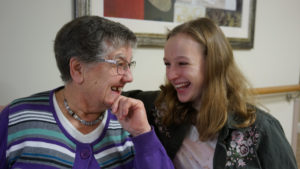 Last month’s Paris Fashion Week declared that ‘ageing is cool,’ and with elderly models and celebrities such as Helen Mirren, Pamela Anderson, and Andie MacDowell showing up with no make-up, ‘natural’ hair, and effortless outfits, declared it was celebrating the joy of being natural and authentic at every age. But as Guardian columnist Viv Groskop wrote, ‘these women would be fabulous in a bin bag.’ However, commentators believe real change is afoot. They see a distinct move towards what is called “pro-ageing”, in which the ageing process is celebrated. But ageism goes deeper than appearances, and is resistant to change even in the face of the evidence, as Vogue Magazine proved in 2016.
Last month’s Paris Fashion Week declared that ‘ageing is cool,’ and with elderly models and celebrities such as Helen Mirren, Pamela Anderson, and Andie MacDowell showing up with no make-up, ‘natural’ hair, and effortless outfits, declared it was celebrating the joy of being natural and authentic at every age. But as Guardian columnist Viv Groskop wrote, ‘these women would be fabulous in a bin bag.’ However, commentators believe real change is afoot. They see a distinct move towards what is called “pro-ageing”, in which the ageing process is celebrated. But ageism goes deeper than appearances, and is resistant to change even in the face of the evidence, as Vogue Magazine proved in 2016.
In 2016 Vogue Magazine celebrated its 100th anniversary with a cover photograph of 100 year old Bo Gilbert who was living in sheltered housing, recruited by the designer who had spotted her picture in a local newspaper story about her birthday. Bo was photographed perched on a tall bar chair, wearing designer glasses and clothes, and she looked gorgeous. Someone dropped a comment on Vogue’s website saying that Bo showed how beauty comes from the inside, inferring that she wasn’t actually attractive, but her good nature was shining through. ‘Look again!’ another retorted, ‘She is simply a beautiful woman.’ And so she was, but her beauty did not deflect ageist reactions. Ageing will be accepted only when ageism itself is rooted out, no matter how beautiful you are. When researching for my book, ‘What ‘s Age Got To Do With It’, I discovered that the World Health Organisation finds that globally, ‘1 in 2 people are ageist against older people .’ They engage experts to find ways of eradicating it.
 Ageism is perpetuated by myths that are not challenged. Examples are that older people can’t learn new things (can’t teach an old dog new tricks), that they are grumpy and judgemental, that illness and depression are inevitable, that they have poorer cognition (the ability to think), and their brains are now in inevitable declining. In reality, studies show that neurogenesis, that is the growth of new neurons, happens in older brains as well as younger. Poor health is not inevitable. Dementia is not a given part of old age – most don’t develop it; and many older people live productive lives, especially those who exercise and stay physically and mentally fit. The reason I can’t shin up a telegraph pole in less than a minute – as I could until my mid-fifties, is because I’ve become self-indulgent and sedentary.
Ageism is perpetuated by myths that are not challenged. Examples are that older people can’t learn new things (can’t teach an old dog new tricks), that they are grumpy and judgemental, that illness and depression are inevitable, that they have poorer cognition (the ability to think), and their brains are now in inevitable declining. In reality, studies show that neurogenesis, that is the growth of new neurons, happens in older brains as well as younger. Poor health is not inevitable. Dementia is not a given part of old age – most don’t develop it; and many older people live productive lives, especially those who exercise and stay physically and mentally fit. The reason I can’t shin up a telegraph pole in less than a minute – as I could until my mid-fifties, is because I’ve become self-indulgent and sedentary.
Dr Becca Levy, world leading Yale professor and pioneer in the field of ageing has published studies that demonstrate how changing your beliefs about ageing can add years to your life. She describes how many aspects of ageing that we consider to be inevitable, such as memory loss, poor hearing, and declining cardiovascular events, are in fact influenced by our own negative biases, often informed by cultural ageism. In her new book, ‘Breaking the Age Code’ she shows how just changing the way you think about ageing can add years to your life. She draws on pioneering research to offer stunning revelations about the mind-body connection. She demonstrates that many aspects of ageing we consider to be natural, such as memory loss, hearing decline and cardiovascular events, are in fact influenced by our own negative biases, often informed by cultural ageism. She tackles head on how we can shift these outdated ideas at a societal level and what we can do to help ourselves.
Harvard Professor, Ellen Langer, demonstrated the power of our thoughts with a group of men in their 80s who became physically younger when their thoughts were changed in an experiment run by her and her team. Her book, Counter-Clockwise tells the story. (I’ve described it in Dementia: Pathways to Hope.)
Ageist attitudes at work were the reason many 50-60 year olds took retirement during the pandemic, leaving companies under-staffed and the economy suffering. The same thing happened in America. So educators in New York introduced educational courses in high schools to change teenagers’ negative attitudes. The New York City Mayor, Eric Adams said it would help the city’s youth recognise biases, ‘so they can dismantle what may be their own and other people’s ageist views’.
God planned a balanced culture in society, one where the young have strength and enthusiasm, and the older wisdom and encouragement (Proverbs 20:29). An example of this was a project in Oxford where 12 pensioners were matched with 12 unruly school pupils, simply to befriend them and to listen to them. Friendships were formed, the pupils’ behaviour improved along with their school marks and the school was moved out of special measures. The project has been described as a template for others to follow.
Interestingly, as we grow older we become less conformed to the beauty standards of the younger – because that’s what they are. They just don’t matter any more. As an older woman I’m finding that I have more ‘licence’, or freedom, to talk about Jesus. Over a period of months earlier this year I took several taxi trips, and had amazing conversations about faith with the drivers. One even came with me into the church where I was due to speak, and met the team waiting inside.
In God’s economy, your value does not depend on the number of years you have ahead of you. Rather, it pivots on Ephesians 2:10. ‘For we are His workmanship, created in Christ Jesus for good works, which God prepared beforehand so that we would walk in them.’ Notice that there is no ‘until’, or ‘use-by’ date. I have stories of people in their late 80s and 90s, even a couple of 100 year olds still engaged in ‘good works’.














